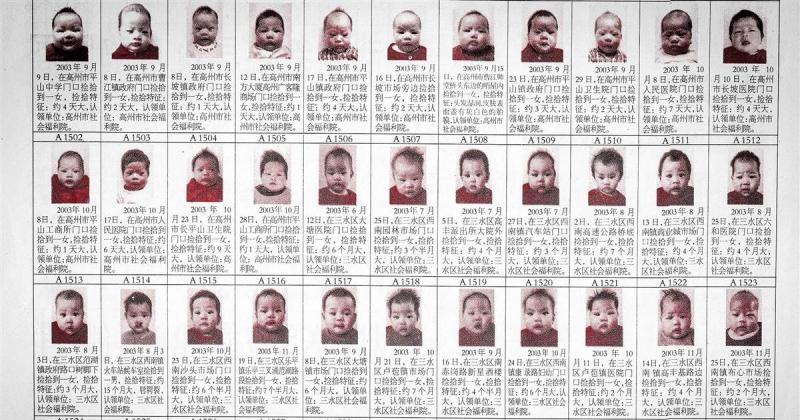In connecting Chinese adoptees to birth families, couple makes discovery about China's one-child policy



After learning their child's adoption documents were fake, a Utah couple launched an initiative to help connect adoptees to parents. Chinese adoption agencies placed "finding ads" of abandoned babies in newspapers.Courtesy Nanfu Wang / PBC
Breaking News Emails
Get breaking news alerts and special reports. The news and stories that matter, delivered weekday mornings. SUBSCRIBE March 30, 2020, 9:13 PM UTC By Agnes Constante
When Brian Stuy adopted his oldest daughter from an orphanage in China in 1998, his decision stemmed from a sincere belief that there was a humanitarian need, he said.
He believed that kids were being abandoned on the side of the street and that Chinese orphanages were full of children. But when he later learned that those things weren't true in the majority of cases, that discovery was a huge betrayal, he said.
In researching the origins of his oldest daughter, adopted in 1998, Stuy learned that children at Chinese orphanages often weren’t actually unwanted or abandoned. China’s controversial one-child policy and preference for boys led many families to relinquish their infant daughters in public spaces in hopes that another family would adopt them.
The policy also created a trafficking market in China, Stuy said, particularly after the country began its international adoption program: It costs up to $25,000 to adopt a child.
“I still love the fact that I have my kids, don’t get me wrong there,” Stuy said. “But it does change the way you view the need for me to have participated in international adoption.”
Stuy and his wife, Longlan Stuy, went on to establish an information service in 2003, research-china.org, to help connect adoptees to their birth families. He augmented those efforts in 2013 when he established DNA Connect, which collects DNA from more than 400 families and has matched 63, Stuy said.
The couple's work and findings have been featured in a number of publications and are highlighted in the 2019 award-winning documentary “One Child Nation,” which explores the repercussions of China's one-child policy. The film, directed by Nanfu Wang, airs Monday on PBS at 9 p.m. CST.
China began its international adoption program in 1991, and adoptive families were told that the children being adopted had been abandoned at orphanages, at schools and on the streets.
An estimated 110,000 children from China have been adopted globally through the program, the majority of whom are in the United States. From 1999 to 2018, American families adopted about 81,600 children from China, according to the State Department.
The Morning Rundown
Get a head start on the morning's top stories. Sign Up
This site is protected by recaptcha Privacy Policy | Terms of Service
The Stuys were among those families.
The shift in Stuy's perspective on China's international adoption program began nearly two decades ago, in 2002, when the orphanage he adopted his second daughter from declined to provide him with her finding notice.
That prompted Stuy to search for the information himself.
These notices, he said, contain information about the child's gender, when and where they were found, their birthdate, how old they were when they were found and what orphanage was caring for them.
He and his wife traveled to China to search for the newspaper that published those finding ads. They then began collecting and compiling all the ads they found, which Stuy noted are important to adoptees' families because they also contain the earliest available photos of the children prior to adoption.
He used the ads to start research-china.org, a paid service that provides adoptive families with information about adoptees' birthplace and history.
By 2008, the Stuys had collated more than a decade's worth of finding ads, along with interviews with orphanage directors. From that data, they gleaned patterns indicating that the reports had been fabricated: They found that the same information had been used repeatedly for multiple children.
“The adoption community, we’ve all been raised with the idea that the birth families abandoned adoptees,” Stuy said. “And that understanding carries with it an emotional response on the part of the adoption of the adoptee, you know — ‘My parents didn’t want me. Why should I want to search for them?’ But in the majority of cases, there was no abandonment.”
China implemented the policy of limiting each family to one child in 1979 to slow the growth of the country's population. At that point, it was already the world's most populous country.
The policy ended in 2015. And according to the Chinese government, it prevented about 400 million births.
The film notes that while the policy succeeded in lowering China's birthrate, it spurred human trafficking when China began its international adoption program and deprived domestic families of the ability to adopt.
“If your family is inside China and you wanted to adopt, and you are not able to afford the money they ask for, you’ll never get to adopt from the orphanage,” Longlan Stuy said. “That created a big market to keep targeting people in China. Those people kidnapped the kids from other families and then sold them to other families.”
The cost of adopting a child from the country ranged from approximately $15,000 to $25,000. The money was used to pay traffickers who would bring in babies, according to the film. One person featured in the documentary was a former trafficker who said he was paid $200 for every infant he brought to an orphanage.
Since “One Child Nation” was released, Stuy said he has received more than 200 emails from adoptees, most of whom said that they weren't aware they could find their birth families. He said he expects to receive more emails after “One Child Nation” is shown on PBS.
By watching the film, Stuy hopes adoptees and parents of adoptees will be prompted to question the validity of the information they've been told about adoption, he said.
“We hope that the adoptees will rethink their emotional and intellectual position relative to their birth families and change their minds and say, ‘I need to start from the beginning and see how much of this I can find out to be true or not,’” he said.
Agnes Constante About Contact Careers Coupons Privacy policy Do Not Sell My Personal Information Terms of Service NBCNews.COM Site Map Advertise AdChoices
© 2020 NBC UNIVERSAL
